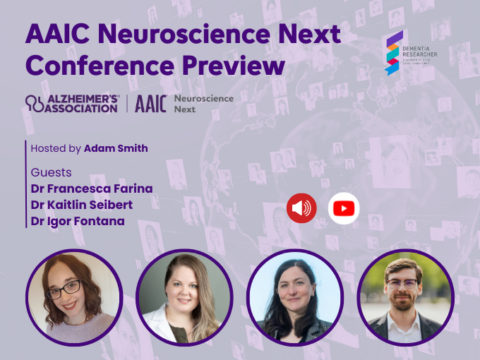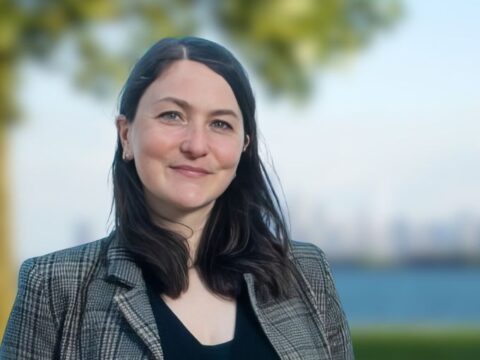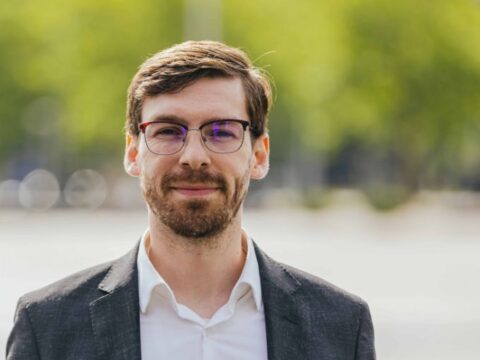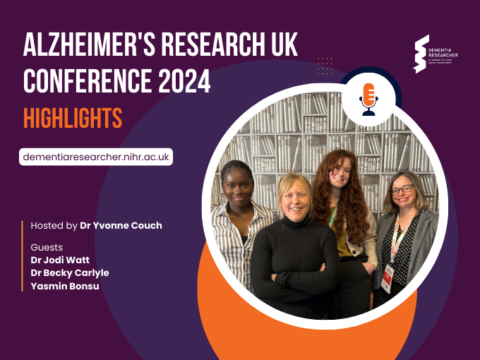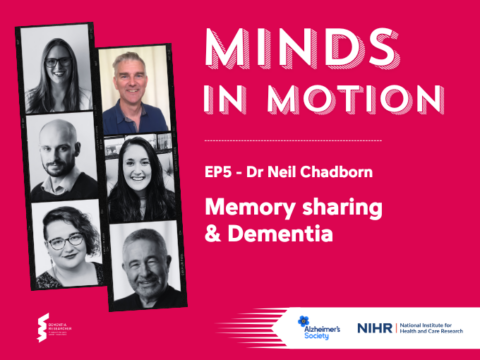A five-part special relay podcast series, where the interviewee becomes the interviewer. With five leading researchers discussing their research, their field, and the work of the Alzheimer’s Association ISTAART Professional Interest Area they represent.
Part Three – Dr Prashanthi Vemuri interviews Dr Cécilia Samieri
Dr Prashanthi Vemuri is Associate Professor of Radiology at The Mayo Clinic College of Medicine and Science, Rochester, USA. Prashanthi’s research is focused on imaging biomarkers of Neurodegenerative and Cerebrovascular Disease. She is representing the Reserve, Resilience, and Protective Factors PIA.
Dr Cécilia Samieri is an Epidemiologist and Senior researcher at INSERM (French National Institute for Health), in Bordeaux, France. Cécilia’s research looks at Nutritional epidemiology, lifestyle risk factors, exposome. She is representing the Nutrition and Metabolic Disorders PIA.
The Alzheimer’s Association International Society to Advance Alzheimer’s Research and Treatment (ISTAART) convenes the global Alzheimer’s and dementia science community. Members share knowledge, fuel collaboration and advance research to find more effective ways to detect, treat and prevent Alzheimer’s and other dementias. Professional Interest Areas (PIA) are an assembly of ISTAART members with common subspecialties or interests.
There are currently 25 PIA covering a wide range of interests and fields, from the Alliance of Women Alzheimer’s Researchers (AWARE) PIA to Biofluid Based Biomarkers and everything in between.
To sign-up to ISTAART and a PIA visit www.alz.org/istaart/
Adam Smith:
Hello and thank you for listening to our ISTAART PIA Relay Podcast series, brought to you by NIHR Dementia Researcher. ISTAART is a professional society and part of the Alzheimer’s Association, representing scientists, physicians, and other dementia professionals active in researching and understanding the causes and treatments of Alzheimer’s disease and other dementias. In this five- part series we’ve asked members of ISTAART professional interest areas to take turns at interviewing their colleagues and being interviewed themselves. Confused? Don’t worry. It’ll all become clear as the week progresses. We will be releasing one of these podcasts every day in the build-up to the Alzheimer’s Association International Virtual Conference, to showcase the work of ISTAART PIAs. Thank you for listening.
Dr Prashanthi Vemuri:
Hello everyone, and thanks for joining us. I’m Prashanthi Vemuri, and I’m an associate professor of radiology at Mayo Clinic, Rochester. I am the chair of the reserve resilience and protective factors PIA. And today it’s my pleasure to be talking to Dr. Cecilia Samieri. Dr. Samieri, welcome. Can I start by asking you to introduce yourself and tell us which PIA you’re involved with?
Dr Cécilia Samieri:
Good morning, everyone. I am an epidemiologist. I work in France. I worked for the French National Institute for Health, which is called INSERM. As I’m co-chair of the PIA on nutrition and metabolic disorders with my colleague, Hussein Yaseen. My field of research is about nutrition, and I am in general, I try to understand the environmental risk leading dementia. We have a specific interest for nutrition, for sure, but also for [inaudible 00:02:06] more broadly. I have a thesis in veterinarian medicine and after two years of clinics as a vet, I decided to move into research. And I discovered epidemiology during master degree, actually in the epidemiology and statistics in Paris. And then I completed a PhD in Bordeaux, France, and went to the U.S. for postdoctoral fellowship at Harvard School of Public Health with Dr. Grodstein, where I leveraged very large U.S. cohorts, such as [inaudible 00:02:42] study. And at this time we were interested in understanding how heavy diets such as for example, the Mediterranean diet could protect the brain. And we thought, for example, that a higher adherence to a Mediterranean diet was associated with a greater odds of heavy ageing.
Dr Prashanthi Vemuri:
Everybody is interested in diet. Can you tell us a little bit more about what your own research says about it and what we should follow?
Dr Cécilia Samieri:
Of course, so diet is very important, as you all know, we have been talking a lot about the Mediterranean diets and more recently about the MIND diet, which was proposed by Dr. Martha Clare Morris from Chicago, which is a diet quite close to the Mediterranean diet, but with more specific foods and nutrients, very interesting for the brain such as polyphenols, B vitamins, for example. So diet is really a core component of optimal cardiovascular health. And we have been working a lot also in France on optimal cardiovascular health. And for example, we demonstrated in the free city cohort, which is a cohort we are leading in France that a greater adherence to optimal cardiovascular health was really associated with a lower risk of developing dementia and less cognitive decline. So I would say that diet is very important in the context of cardiovascular health in general.
Dr Prashanthi Vemuri:
That’s very interesting. Can you tell us about the hot topics in your field at the moment? What are the next questions? And what should, what are all of you are working on?
Dr Cécilia Samieri:
Well, one of the very important thing is really to demonstrate with a well-designed clinical trial the [inaudible 00:04:40] such a diet, and this is really ongoing in France, in U.S., in Europe, and in several areas in the world. And also the field is moving currently to molecular epidemiology because they’re having a lot of advances in, in analytical methods so we are currently thinking about precision prevention and applied nutrition. I would say, we would call that nutrition at precision nutrition. So this is something very interesting in a novel topic, I think.
Dr Prashanthi Vemuri:
Can I ask you a personal question, which is, I have a tough time sticking to a diet. How do you run clinical trials where people are adhering to diets. It’s a very difficult thing. And I’m sure you guys have thought about a lot of these issues. Can you comment on that?
Dr Cécilia Samieri:
Well, this is very critical aspect of these kinds of intervention studies. I’m not sure it’s really…that’s feasible. I mean, people are trying really hardly to set up these trials. I personally never tried to set up a trial. I have been doing more observational studies, which are challenging as well, but trials are really a big deal. So I mean, it’s science, it’s not always easy. And the nutrition is especially very, very hard because people have to follow the diet, we have to have a cultural group and people need to eat. So which control group are you going to choose, etc. So it’s a very, very challenging area.
Dr Prashanthi Vemuri:
You have a fantastic background in mathematics and statistical modelling. I mean, it’s impressive to see your growth over the years. Are there any methods out there that account for the noise that comes from adherence or are people thinking about that?
Dr Cécilia Samieri:
Well, I don’t know. It’s, I mean, people have to work hard to prepare statistical modelling, but in terms of adjusting for adherence in the trial, I mean, you can imagine any kind of statistical modelling you want. If the trial is difficult to set up, it remains data, which are difficult to analyse at the end.
Dr Prashanthi Vemuri:
Yeah. Exciting field actually. So can you talk a little bit about your work of your PIA and how it supports the field of your search and what you’re doing currently?
Dr Cécilia Samieri:
Yeah, so the nutrition and metabolic disorder PIA is a very important too for our research community as any PIA, I would say, but in our field in nutritional epidemiology, it’s a very small and tiny field in the dementia community. So it’s especially important for us to have this opportunity to meet and to discuss and to brainstorm about all the challenges. For example, we are currently discussing how to pull cohort data because there are a lot of data in U.S. and Europe, and we have very few efforts to do a highly powered analysis with putting the data. So it’s really a nice idea. And the challenge that we are currently discussing, we are discussing organising a one day symposium [inaudible 00:08:10] to the next AAIC in Boston. And we are also discussing a white paper right now on a precision nutrition. So this is, I mean, very important for our community. I mean, it must be common to all different PIAs, but for us, I mean, it works really well.
Dr Prashanthi Vemuri:
I am really surprised about how important the findings that are coming out of members from your PIA about how much impact nutrition has on dementia. It’s a pretty large impact. The whole research that you talked about which is cardiovascular metabolic health and how it impacts dementia, it is huge. I’m excited. Does your PIA have any view of where the field is headed? Like in terms of how we can change or reduce dementia risk?
Dr Cécilia Samieri:
We are discussing a lot and that it’s going to be…One of the goals of our one day symposium next year, I would say, would be to end with, you know guidelines and ideas for the future in terms of research and how to get people more involved into the field and how to get people follow the recommendations as well. So it’s supposed to be, I mean, we are currently discussing that a lot, but with a few teleconference, it’s not enough. And we are going to try to organise that one day meeting. Hopefully it will work out.
Dr Prashanthi Vemuri:
That’s great. To get guideline from you would be fantastic. And can you tell us a little bit about how the committee’s organised and how your group is organised to be able to do this outreaching work and development of the guidelines at the conference?
Dr Cécilia Samieri:
Well, we have, of course chairs and co-chairs. So there is Hussein Yassin and myself as the two co-chairs. We have a program chair [foreign language 00:10:15] from the Netherlands, who is organising all the meetings and also the PIA day, etc., the program. We have a communication chair, [foreign language 00:10:28], who helps with communication and also a student representatives, [foreign language 00:10:32], who is my foreign PhD students, and she’s now a postdoc fellow in Chicago. And also the past immediate chairs and program chair, Jean Bowman, and Nicole [inaudible 00:10:48] still help a lot and still meet with us to organise the executive committee and the different meetings. So we have regular teleconference to discuss of course organisation, and we also have a separate time slot to discuss the white paper and the scientific aspects we were talking about previously.
Dr Prashanthi Vemuri:
That’s great. Can you tell the early career researchers who are listening to this podcast, can you tell them how they could get involved in the PIA?
Dr Cécilia Samieri:
Yeah, so they can register to as an ISTAART member, it’s the first step. And then they can ask for being involved by sending an email to myself or any member of the executive committee. And we’ll be happy to welcome officially early careers, such as, are really welcome in that community, because they are going to be the people capable of doing for example, the pruning projects, etc. So we really need some young careers to lead that kind of projects.
Dr Prashanthi Vemuri:
That is fantastic. On the same note, do you have any advice for early career researchers who are interested in dementia research? And I am really impressed. You feel finding the right path you are on and reaching where you are. Do you have any advice in general for dementia researchers or really early researchers who are trying to decide their field. Do you have any advice for them?
Dr Cécilia Samieri:
Well it takes time, of course, but I really think because it happened for me that the Alzheimer’s Association is really the great place to meet people and year after year to feel comfortable with the field and to learn a lot. So this year is getting to be very special with that web seminar. But at the same time, it’s a great opportunity to really choose and pick up exactly the sessions you want. And also have the opportunity to listen to other PIA days, because usually you are involved in your own PIA and you don’t go listening to others, well, the schedule is quite complex, but this year it’s going to be very special. So it’s really a great opportunity. And usually when meeting face to face it’s even better. So I would encourage people to still go into real true conferences and meet people.
Dr Prashanthi Vemuri:
Very true I think Cecilia, very important point that remember last year we were walking from room to room, getting snacks in between and trying to make every single meeting. You’re really right, by organising it across a week they did a great job by facilitating everybody, especially the early investigators to attend each one. That’s a great point. So whoever is listening, if you’re available the week of August 3rd to 10th, when the PIA has these live sessions, you have probably an opportunity to attend each one of those if you become an ISTAART member. So, as Cecilia pointed out, please consider that if you want to get more involved and learn about each PIA, each field and get involved in whichever way you want. So, that’s great. So you talked a little bit about what your PIA’s plan aims for the upcoming year. Can you give us a little bit of insight into what we should expect from your PIA in terms of the PIA day in August?
Dr Cécilia Samieri:
So we have discussed a lot, I guess you too, in your own PIA about this new organisation. So that will be a PIA day pre-recorded this year and available online during the entire conference, in which we have scheduled oral and poster presentations. There will be, I think, eight oral and 11 poster presentations by PIA members. And we have organised a presentation award also for one best poster and one best oral presentation for early career people that is to the postdoc or junior faculty.
Dr Cécilia Samieri:
And it’s in dedication of Martha Clare Morris, you know our past chair, PIA chair who passed away a few months ago and we are all working in her memory and we really decided to organise this award in dedication of her. Then after that, I think that will be a chat box open during the entire conference and the weeks after for people to ask questions about the presentations. And at the end of August, we have a live session organised so that people can ask their questions about the presentations they heard online and we are also going to talk about the business meeting and different aspects, and also the chairs and different people will talk about our scientific efforts.
Dr Prashanthi Vemuri:
We are getting towards the end of the podcast. But before you go, we’d like to ask a final question. What advice would you like to give any aspiring scientists out there who are thinking about looking into dementia?
Dr Cécilia Samieri:
Well, we should all meet together and, and think about the research of over [inaudible 00:16:44] because I really think it’s a multi-factorial disease dementia. So if everyone stays in his own field, it’s going to be hard to face and to tackle the disease. So we really need to think about multi domain prevention. And so, I mean, you are working hard on cognitive research. It’s also life [inaudible 00:17:10]. So we really need to foster our efforts and to work together, to understand the entire model, the entire physio-pathological model.
Dr Prashanthi Vemuri:
I couldn’t agree more. I think it’s a multi-factorial disease and multiple factors do cause dementia. Thank you, Dr. Samieri for taking time to join us today. It was a fantastic session and I think we learned a lot from you. Thank you.
Dr Cécilia Samieri:
Thank you. Thank you very much.
Adam Smith:
Thank you so much for listening. You can find details and profiles on today’s panellists and information on how to become involved ISTAART on our website at dementiaresearcher.nihr.ac.uk, and at alz.org/istaart. We’ll be back tomorrow with the next recording of in our ISTAART PIA relay podcast series. Finally, please remember to subscribe, like and review our podcast on iTunes, Spotify, and all the other places where you find your podcasts. Thank you.
END
Like what you hear? Please review, like, and share our podcast – and don’t forget to subscribe to ensure you never miss an episode.
If you would like to share your own experiences or discuss your research in a blog or on a podcast, drop us a line to adam.smith@nihr.ac.uk or find us on twitter @dem_researcher
You can find our podcast on iTunes, SoundCloud and Spotify and where ever you get your podcasts.
Finally, the views and opinions expressed by guests in this podcast represent those of the guests and do not necessarily reflect those of NIHR Dementia Researchers, PIA membership, ISTAART or the Alzheimer’s Association.

 Print This Post
Print This Post